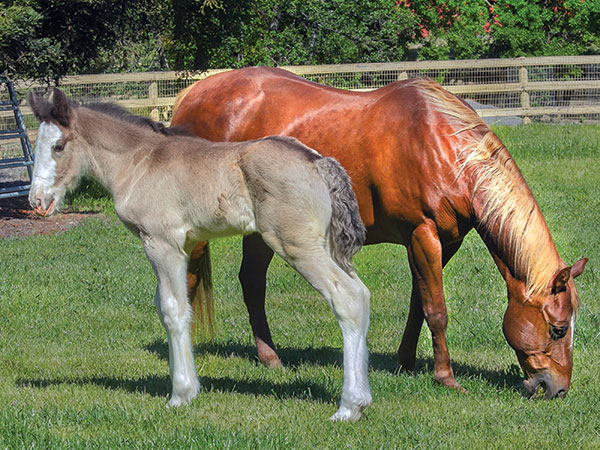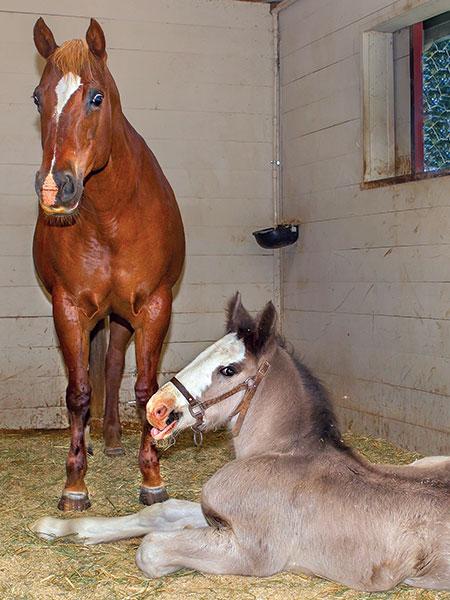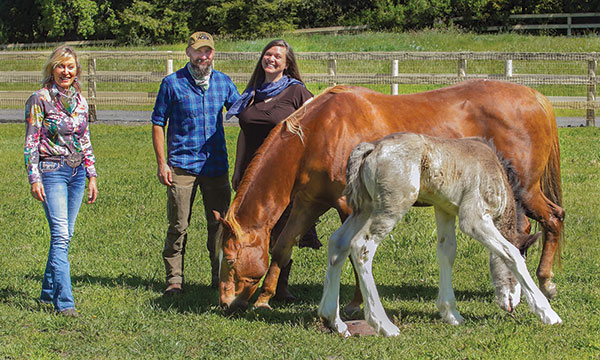
SANTA ROSA—You’ve heard the saying, “when life hands you lemons, you make lemonade.” Well, a pair of misfortunes 130 miles apart in early April led to a refreshing feel-good story about an unlikely match.
It began with the joy of two new foals about to enter the world. One was a long-hoped-for colt out of the 18.1-hand black Clydesdale mare, Nakita, and the other a filly out of a 14.1-hand Quarter Horse reining mare, Whiz Ms Dolly.
Tragedy struck both foalings. Nakita, after delivering a healthy colt, died soon after from complications. Meanwhile, at a ranch in Santa Rosa, Britta Jacobson’s mare, Whiz Ms Dolly, gave birth to a stillborn filly.
There are invisible boundaries between breeds and disciplines in the horse world, and the bridge uniting Clydesdales and reiners is a rare one. This one was crossed, in large part because of the willingness of strangers to help each other.
Carl and Kirsten Absher, proud owners of Nakita and her newborn baby Clydesdale, were at home in Shingle Springs when the first phone call came from the veterinary clinic. Their new colt was up and had already nursed once, and the clinic staff invited them to come see their pair that night, making an exception to normal visiting hours. Carl and Kirsten wasted no time in making the 40-mile trip to the clinic to meet the new arrival.
The second phone call came early the next morning. The mare was down with complications, but because she had been under observation per the clinic protocol, the clinic caught it immediately. Then, a subsequent phone call stunned the Abshers; at 4:19 a.m. on April 10, their mare had died.
Not wanting to raise a foal without a mother, the owners reached out to a friend, Shamarie Tong, for help in locating a nurse mare.
Meanwhile, that same morning about a two-hour drive away in Santa Rosa, Britta’s Whiz Ms Dolly gave birth to a stillborn filly.
Having bred and raised her own competition horses for many years and having experienced raising an orphaned foal herself years earlier, Britta knew that her loss could benefit someone else. While still monitoring the mare with her vet, she posted on social media that she had a nurse mare available.

Britta soon was made aware of the orphaned Clydesdale foal through friends and intermediaries on Facebook — including Shamarie, who had posted that her friends had lost a mare and were seeking a nurse mare — and Ryan Fowler of Skyline Silversmiths, the person who first connected the two posts. Britta wasted no time and called.
Kirsten can laugh now when she recollects that first phone call.
“She said, ‘Hi, this is Britta Jacobson of Bennett Valley Ranch. My mare just had a stillborn foal this morning, and if you want a nurse mare, I suggest you pack up your foal right now and get down here! We have saved the placenta to help introduce your foal to my mare!,” she says. “It sounded more like a command than anything, and it was just exactly what my husband and I needed to hear at that moment.”
Several hours later, young Kiskasen was given the OK to travel.
Britta did not know the breed of the foal that was supposed to arrive at her barn to be introduced to her mare.
“Well, I hadn’t thought to ask about the breed of the foal prior to the transport,” she says. “I was somewhat surprised to find out it was a Clydesdale.”
She took the surprise well, though, and in no time Kiskason was unloaded.
Because of the COVID-19 pandemic, all parties donned masks and gloves when the foal arrived at the ranch.
Britta had saved the placenta from earlier that morning, and Carl and Kirsten rubbed the colt with it thoroughly. Then Britta draped it over the foals back and led in the distraught Whiz Ms Dolly.
After a few tense minutes, the mare began to relax and, to everyone’s relief, allowed Kiskasen to nurse.
Kiskasen is now growing up at Bennett Valley Ranch, a beautiful facility owned by Ted and Britta, a longtime reining horse breeder and NRHA Non Pro competitor. This is not a place one would expect to find a purebred Clydesdale colt, let alone one who has a 14.1-hand Quarter Horse for a mother.
A significant portion of the approximately 600 Clydesdales born in the United States each year are bay, with the other colors being chestnut, black, or roan. Kiskasen is one of the small percentage that will be black once he sheds his baby fuzz.
So in the future, when you see Budweiser Clydesdales performing in commercials during the Super Bowl or in a parade, you’ll wonder if Kiskasen will grow up to become one of them — with a little red Quarter Horse following alongside as his mother.

Leave a Comment
All fields must be filled in to leave a message.